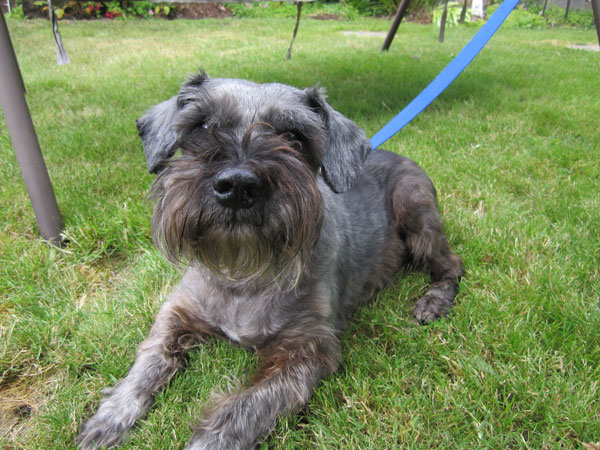Things to Consider Before Adopting a Dog
We rescue mini and standard schnauzers who need homes.
 We are happy that you are considering bringing a pet into your home. A pet can give years of happiness to its family, help children to learn responsibility, be a playmate and companion. Before taking the serious step of adopting a dog, here are some questions to help you decide if a dog is the right pet for you and if so, what kind of dog to get:
We are happy that you are considering bringing a pet into your home. A pet can give years of happiness to its family, help children to learn responsibility, be a playmate and companion. Before taking the serious step of adopting a dog, here are some questions to help you decide if a dog is the right pet for you and if so, what kind of dog to get:
Is a dog the right pet for you? Your dog will depend on you throughout its life, and, with proper care, may live 10 years or more. Are you willing and able to care properly for it and provide it with a stable and loving home for the rest of its life?
Don't get a dog without considering and planning for the costs for such a responsibility. Normal veterinary care includes spaying or neutering, yearly shots and boosters, licenses and examinations for typical diseases. Preventive and consistent care is less expensive in the long run.
Questions to ask yourself and your family before adopting a dog
- How much time can you spend with a dog? Dogs are social creatures; they will not be happy left out in the yard alone. You must be committed to spending several hours a day with a dog.
- What kind of space can you provide for a dog? If you live in a small apartment, you must take this into consideration. Many dogs will not do well in a small apartment unless you expend a great deal of effort to meet their needs. Dogs can be pretty adaptable as long as you help them out.
- How much money can you spend for the care, feeding and training of a dog? Even if you do not purchase a pure-bred dog, you must buy food, pay for veterinary checkups, vaccinations and routine medical care, food bowls, collars, licenses, ID tags, leashes, carriers, etc. Over the lifetime of the dog, the investment can be significant. It also might be necessary to replace items a dog may damage or destroy, or paying for medical emergencies. Do you have the financial resources to cover these expenses?
- How much exercise can you give a dog? If you are very busy and your time is limited, you should look for small or less active dogs that can get enough exercise in your home or from short walks. Perhaps even consider a senior dog. Not all small dogs are less active nor are larger dogs more active. Finds out all that you can about the breed of dog you are considering, even if it is a "mixed" breed.
- How much grooming are you willing to do? All dogs require some grooming. Longhaired dogs are more likely to need more grooming than shorthaired dogs. Grooming is a part of good health. If you get a dog that requires regular grooming, are you prepared to pay for its grooming or learn to do it yourself?
- How much training can you do? No matter what dog you get, training will make your dog much more compatible with you and with what you want to do. A trained dog can go more places with you without disruption and can more easily be a part of your life.
- What are you looking for in a dog? Do you want a dog that will jog with you? Go on long hikes in the woods with you? Do you want a dog that is bouncy and ready to go or one who is more relaxed? Do you want a dog that gets along with other animals? Do you have children? Some breeds are typically very good pets for children and some are not. Do your research.
- Whatever dog you choose, you are making a long-term commitment. Your dog will need attention, love and respect from you: food and water are not enough. Consider your dog part of your family-that is what your dog will think about you, You are its pack.
- You are responsible for your dog's health. Choose a veterinarian before you even get your dog and take your dog there immediately. Even if you are assured the dog is healthy, the veterinarian confirms that and makes sure you are aware of what health checks are required next.
- If you get a dog for protection, you are responsible for making sure that the dog is safe, reliable and trustworthy around people. Never chain a dog up in the backyard or encourage it to snarl and bite other people. You are responsible for your dog's behavior-this means keeping your dog under control. Do not let your dog roam. Keep your dog on a leash when out of a fenced yard and always clean up after your dog when it eliminates.
- You are responsible for your dog's reproduction – have your dog spayed or neutered. Do not become a "backyard" breeder or contribute to the millions of dogs that are destroyed each year in this country because they do not have a good home.
- You are still responsible for the dog when you "get one for your child." Until your child reaches a certain age, he or she will not have enough maturity to take responsibility for a dog. Dogs acquired for this reason often wind up in shelters when the parents realize that they are the dog's primary caretakers. A dog can be a good way to teach children about responsibility, but the ultimate responsibility falls to the adult.
- Do you have time to become more knowledgeable about dogs – don't let your dog wind up in the shelter with a note that says "couldn't be housebroken" or "couldn't be trained." Find some good books to read about dogs and dog behavior-the local library or bookstore has many. Enroll in puppy or dog classes and learn from an instructor. These classes can be fun for you and your dog!
- You are responsible for being prepared for a new dog – Never get a dog as a "surprise gift." All family members must agree on having a dog. Have food, water and food dishes, bedding, collars, leashes, chew toys and a veterinarian lined up before you even pick up your dog.
animal shelters and rescue groups are a great place to start.
You will be saving a new best friend that really needs you.
And If You Are Bringing A Puppy Into The Home Of Older Cats Or Dogs
Be protective of the puppy, and carefully watch to make sure that children and other pets are not too rough with him or her. Keep in mind that for older animals, a new puppy may provide a new lease on life, encouraging a more playful and active attitude. However, others may resent the newcomer and feel lonely and depressed. In these cases, the older animal's health may begin to suffer. An animal that has lived with other animals will probably be more accepting than one that has always been an "only child."
No matter what, it is bound to be a stressful situation and the guardian should protect the older pet as much as possible. Avoid any situation where competition comes into play. For example, keep the older pet's toys, bed or food dishes off-limits to the newcomer, and if either pet has to be restrained, it should generally be the new pet.
The older pet's regular routines need to be followed and its own private time with its guardian should be ensured.
